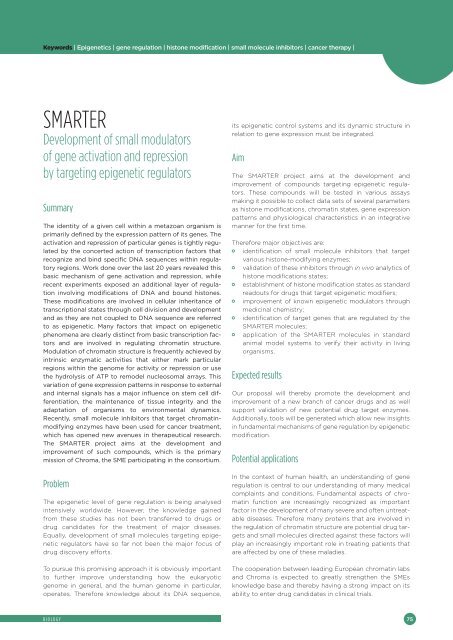You also want an ePaper? Increase the reach of your titles
YUMPU automatically turns print PDFs into web optimized ePapers that Google loves.
Keywords | Epigenetics | gene regulation | histone modifi cation | small molecule inhibitors | cancer therapy |<br />
SMARTER<br />
Development of small modulators<br />
of gene activation and repression<br />
by targeting epigenetic regulators<br />
Summary<br />
The identity of a given cell within a metazoan organism is<br />
primarily defi ned by the expression pattern of its genes. The<br />
activation and repression of particular genes is tightly regulated<br />
by the concerted action of transcription factors that<br />
recognize and bind specifi c DNA sequences within regulatory<br />
regions. Work done over the last 20 years revealed this<br />
basic mechanism of gene activation and repression, while<br />
recent experiments exposed an additional layer of regulation<br />
involving modifi cations of DNA and bound histones.<br />
These modifi cations are involved in cellular inheritance of<br />
transcriptional states through cell division and development<br />
and as they are not coupled to DNA sequence are referred<br />
to as epigenetic. Many factors that impact on epigenetic<br />
phenomena are clearly distinct from basic transcription factors<br />
and are involved in regulating chromatin structure.<br />
Modulation of chromatin structure is frequently achieved by<br />
intrinsic enzymatic activities that either mark particular<br />
regions within the genome for activity or repression or use<br />
the hydrolysis of ATP to remodel nucleosomal arrays. This<br />
variation of gene expression patterns in response to external<br />
and internal signals has a major infl uence on stem cell differentiation,<br />
the maintenance of tissue integrity and the<br />
adaptation of organisms to environmental dynamics.<br />
Recently, small molecule inhibitors that target chromatinmodifying<br />
enzymes have been used for cancer treatment,<br />
which has opened new avenues in therapeutical research.<br />
The SMARTER project aims at the development and<br />
im provement of such compounds, which is the primary<br />
mission of Chroma, the SME participating in the consortium.<br />
Problem<br />
The epigenetic level of gene regulation is being analysed<br />
intensively worldwide. However, the knowledge gained<br />
from these studies has not been transferred to drugs or<br />
drug candidates for the treatment of major diseases.<br />
Equally, development of small molecules targeting epigenetic<br />
regulators have so far not been the major focus of<br />
drug discovery eff orts.<br />
To pursue this promising approach it is obviously important<br />
to further improve understanding how the eukaryotic<br />
genome in general, and the human genome in particular,<br />
operates. Therefore knowledge about its DNA sequence,<br />
its epigenetic control systems and its dynamic structure in<br />
relation to gene expression must be integrated.<br />
BIOLOGY 75<br />
Aim<br />
The SMARTER project aims at the development and<br />
improvement of compounds targeting epigenetic regulators.<br />
These compounds will be tested in various assays<br />
making it possible to collect data sets of several parameters<br />
as histone modifi cations, chromatin states, gene expression<br />
patterns and physiological characteristics in an integrative<br />
manner for the fi rst time.<br />
Therefore major objectives are:<br />
• identifi cation of small molecule inhibitors that target<br />
various histone-modifying enzymes;<br />
• validation of these inhibitors through in vivo analytics of<br />
histone modifi cations states;<br />
• establishment of histone modifi cation states as standard<br />
readouts for drugs that target epigenetic modifi ers;<br />
• improvement of known epigenetic modulators through<br />
medicinal chemistry;<br />
• identifi cation of target genes that are regulated by the<br />
SMARTER molecules;<br />
• application of the SMARTER molecules in standard<br />
animal model systems to verify their activity in living<br />
organisms.<br />
Expected results<br />
Our proposal will thereby promote the development and<br />
improvement of a new branch of cancer drugs and as well<br />
support validation of new potential drug target enzymes.<br />
Additionally, tools will be generated which allow new insights<br />
in fundamental mechanisms of gene regulation by epigenetic<br />
modifi cation.<br />
Potential applications<br />
In the context of human health, an understanding of gene<br />
regulation is central to our understanding of many medical<br />
complaints and conditions. Fundamental aspects of chromatin<br />
function are increasingly recognized as important<br />
factor in the development of many severe and often untreatable<br />
diseases. Therefore many proteins that are involved in<br />
the regulation of chromatin structure are potential drug targets<br />
and small molecules directed against these factors will<br />
play an increasingly important role in treating patients that<br />
are aff ected by one of these maladies.<br />
The cooperation between leading European chromatin labs<br />
and Chroma is expected to greatly strengthen the SMEs<br />
knowledge base and thereby having a strong impact on its<br />
ability to enter drug candidates in clinical trials.
















